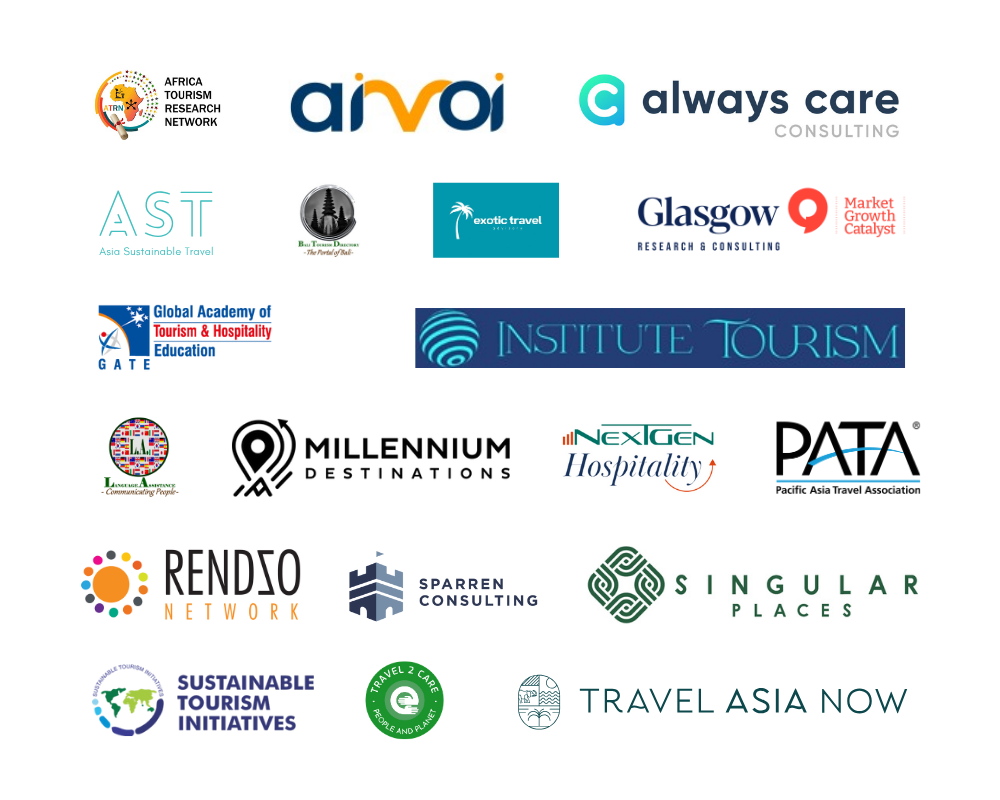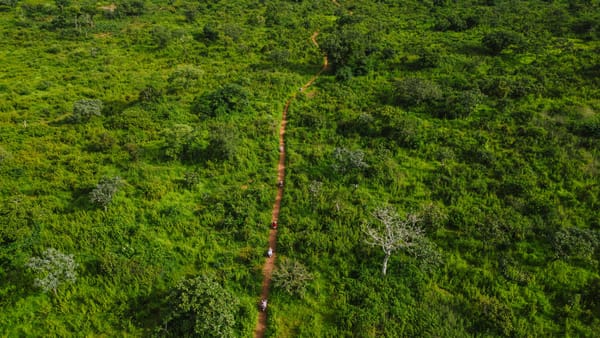Meaningful Tourism with a capital “M”


Dear reader,
the Faroe Islands are one of the most beautiful, but also extremely remote, tourist destinations. The upkeep of the sites requires regular maintenance. The local authorities have come up with a special way to change this task from a tedious and expensive burden for the tiny local budgets to a clever tourism marketing tool. Every year in the off-season, a weekend is set aside for maintenance work. Since 2019, between 6 and 11 sites have been “closed for maintenance” each year. The projects are identified by local municipalities and tourism offices to improve and withhold safety and infrastructure for locals and visitors alike.
Volunteers can apply to become part of the project, receiving free accommodation and food in exchange for physical work combined with a close encounter with the local population and the local nature. The volunteers are selected according to their skills and their passion for the preservation of nature and wildlife. The tasks vary, but may include creating pathways, constructing viewpoints, and installing wayfinding signs to make navigation easier. Once in a while, historical sites are repaired to maintain their cultural heritage.
This year, 80 volunteers were selected out of more than 15,000 applications, almost half of them travelling to the islands – at their own cost – from outside of Europe. This example of a Meaningful Tourism approach, aligning the interests of the visitors, the host community, the employees and owners of the local tourism and hospitality service providers, the local government and the physical and cultural environment, may not be easily translated to action in a big city like New York or a tourism hotspot like Venice. For the majority of destinations, however, countries, islands, mountain areas, etc., and attractions like National Parks, such a “Closed for Maintenance” period can bring visibility, new friendships, a positive experience of the local population with visitors, and a cost-efficient way of upkeeping and improving the infrastructure.
Such an initiative will, however, only succeed if it is embedded into a holistic Meaningful Tourism strategy, if it is meant to be more than a marketing gag. Measurable results and long-term engagement are necessary to produce the enthusiasm needed both for the volunteers and the locals to band together.
Such Meaningful Tourism strategy needs a Meaningful approach with a capital “M”. Making things a little bit more meaningful will not succeed. The Meaningful Tourism paradigm is a holistic and systematic way to move forward the idea of sustainable development, not just another attribute without a fixed meaning and with no way of measuring success or failure in a transparent way.
This week the Meaningful Tourism Centre had to great honour and joy to is not nice-to-have, cooperate with PATA Pacific Asia Travel Association, providing a webinar featuring three experts from PATA including the CEO, and four experts from the MTC, including the publisher of Meaningful Tourism Weekly and the founder of the MTC, your humble editor. More information about the webinar can be found in the MTC News section below.
The next chance to participate in person in an open Meaningful Tourism Transformational Game Workshop is on August 25, 2025, in Bangkok in connection to the PATA Travel Mart. For organisations, companies, and destinations, one-day training workshops can be provided by the more than 30 Certified trainers at the time and place chosen by the organising partner.
As always, all best wishes from Prof. Dr. Wolfgang Georg Arlt and the entire Meaningful Tourism Weekly team in Kathmandu and in Manila!


With the Meaningful Tourism movement gaining momentum, the MTC is starting to work with tour operators who decided to use the Meaningful Tourism paradigm as the base of their work.
A company in Vietnam has been moving down this path already by taking sustainable tourism seriously and using it not just as a marketing gimmick.
In 2024, Vietnam welcomed more than 17.5 million international visitors. 80% of them arrived from Asian source markets, with South Korea and Greater China responsible for about 10 million arrivals alone.
Vietnam offers a diversity of nature from the misty mountains of the north to the sun-drenched coastlines of central Vietnam and the fertile deltas of the south. However, only a handful of operators stand out for placing sustainability at the heart of their business. They do so while achieving commercial viability, proving that travel businesses can thrive while providing benefits and satisfaction to all stakeholders.

Oxalis is one of Vietnam’s leading adventure travel companies, offering transformative journeys and meaningful experiences that are rooted in community upliftment, ecological awareness, and a deep respect for place.
One example is Quảng Bình, one of Vietnam’s poorest provinces, that is now attracting adventure seekers from across the globe to visit the large caves inside the Phong Nha-Kẻ Bàng National Park, which were used in filming the movie Kong: Skull Island.
Oxalis company and its founder Nguyen Chau A is mainly responsible for putting his hometown Phong Nha onto Vietnam’s adventure travel map. He started almost 15 years ago to create new, world-class adventure experiences while building a tourism model that would generate jobs, protect nature, and empower local communities to become stewards of the land — rather than exploiters of it.
Oxalis allows only 1,000 travelers per year to take part in a six-day expedition to ensure minimal environmental impact, with waiting lists extending into 2027 already. In an area once impacted by illegal logging and wildlife hunting, this conservation-led tourism model offers a better alternative: protecting the forest is more profitable than cutting it down. The expedition alone has created stable employment for 125 local residents, including formerly illegal loggers, providing them with monthly incomes far above the regional average.
The portfolio of Oxalis also includes single-day cave experiences, with tour group sizes kept intentionally small to minimize environmental impact. Guests are provided with reusable water bottles, portable water filters, and composting toilets at campsites. Cooking is done using gas and plant-based coal, eliminating the need for wood fires and preserving forest resources.
Oxalis’s vision extends beyond the caves. The company has developed a growing network of eco-friendly lodges and farmstays that breathe new life into local economies while honouring the natural and cultural heritage of the region. Even Tân Hóa, a remote commune which was often devastated by seasonal flooding and seen even by the inhabitants as too hard to reach for tourism development of the local caves, achieved success with the help of Oxalis which seemed impossible to reach. By 2023, UNWTO recognized Tân Hóa as one of the “Best Tourism Villages in the World”, creating economic opportunities that were previously unimaginable. Events like the annual Tú Làn Adventure Race help to raise funds for critical infrastructure such as flood-resilient floating houses and composting toilets.
Oxalis has proven that adventure travel can be a catalyst for long-term social and environmental change by building an economy that values preservation over exploitation and while providing income for all partners involved.
(Based on a text by Jeremy Tran, published in Asia Sustainable Travel)

Meet the Trainer for the Meaningful Tourism Transformative Game Workshop
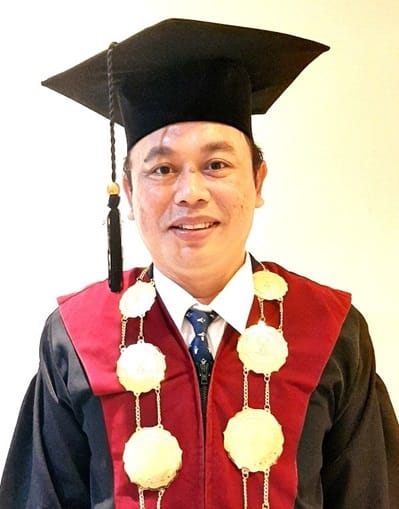
I Nengah Subadra, PhD, is an Associate Professor of Tourism and currently serves as the Head of the Department for Research, Publication, and Community Service at the University of Triatma Mulya in Bali, Indonesia.
With almost ten years of academic experience, he has been actively involved in teaching tourism marketing and research methodology at the graduate level. He holds a PhD in Tourism from the University of Lincoln, UK, where he focused on tourism research, and a Master’s degree in Tourism Studies from the University of Udayana with a specialization in ecotourism. His academic foundation also includes a Bachelor's degree in English Language and Literature from the University of Warmadewa, where he conducted research on tourism discourse analysis. Dr. Subadra’s work integrates academic leadership, research excellence, and a deep commitment to sustainable tourism development.
The Meaningful Tourism Weekly asked Dr. Subadra: What is the current situation of tourism in Bali, and how can the Meaningful Tourism Paradigm help to support its development?
His response: Tourism in Bali has experienced a robust recovery following the disruptions caused by the COVID-19 pandemic. International arrivals have surged, with some months in 2024 already matching or surpassing pre-pandemic levels observed in 2019. By the end of 2023, the island had received over 5.2 million international tourists, alongside a substantial number of domestic visitors. Major source markets such as Australia, India, China, the United Kingdom, the United States, and broader Europe have largely returned, while ongoing diversification strategies continue to expand international reach.
However, the resurgence of tourism has reintroduced symptoms of overtourism, particularly in popular areas such as the southern tourism sites including Kuta, Seminyak, Canggu, Uluwatu, and Ubud. These regions are grappling with severe traffic congestion and overstretched waste management systems, resulting in both terrestrial and marine pollution. Environmental challenges persist, with water scarcity intensified by the hospitality sector’s consumption demands, and further degradation seen in coastal zones, coral reefs, and ecologically sensitive attractions such as rice terraces and waterfalls.

The social and cultural impacts of increased tourist volume have also become pronounced. There is growing discontent regarding cultural commodification, disrespectful tourist behaviour particularly at sacred sites and the inflationary pressures tourism exerts on local living costs. These concerns have reignited debates around the need to prioritise quality over quantity in Bali’s tourism strategy.
Market trends in 2024 show a shift toward more diversified visitor profiles. Segments such as digital nomads, wellness tourists, MICE travellers, and affluent luxury tourists are expanding. Simultaneously, government and industry actors have been promoting lesser-known regions collectively referred to as New Bali; (East, North, and West Bali) to better distribute visitor flows.
While the success of these initiatives is uneven, domestic tourism continues to play a critical role in sustaining the sector. Policy measures have also been introduced to manage the evolving landscape. Most notably, the implementation of a tourism levy in February 2024 requires foreign tourists to pay IDR 150,000 (approximately USD 10), with revenues directed toward cultural and environmental conservation projects. Initial compliance appears strong, though the longer-term efficacy of the measure remains to be assessed. Additionally, there is renewed policy emphasis on transitioning from mass tourism to high-value, sustainable models. Despite this shift in discourse, challenges persist in terms of policy enforcement and stakeholder alignment.
Encouragingly, there is a growing emphasis on community-based tourism (CBT), which seeks to involve local communities directly in tourism development. This approach reflects an increasing recognition of the importance of inclusive, equitable, and culturally respectful tourism practices as Bali charts a path toward a more sustainable and resilient future.
Creating a truly sustainable and resilient tourism economy where the benefits are widely and fairly distributed through Meaningful Tourism is necessary. Bali’s tourism recovery is undeniable, but the resurgence of overtourism symptoms highlights the unsustainability of the old volume-driven model. The Meaningful Tourism paradigm offers a critical pathway forward, placing equity, sustainability, cultural respect, and transformative experiences at its core. Crucially, it demands a fundamental shift towards the equitable distribution of tourism profits.
The focus on value over volume, deep connection over superficial consumption, regeneration over degradation, and centrally equitable benefit for all stakeholders over extraction, Bali shall transform its tourism industry. This means ensuring local communities receive a fair share of revenue through ownership, fair wages, local sourcing, and strategic investment of levies. When profits are shared justly, communities are empowered, cultures are sustained, environments are protected, visitors have richer experiences, and ethical businesses thrive. This requires unwavering commitment from government, industry, communities, and visitors alike to achieve the goal, but it is essential for Bali’s future as a valued global destination.


Successful PATA Webinar: A Meaningful Pacific Asia Tourism Economy – Video now available
On July 8, 2025, MTC, in cooperation with the Pacific Asia Travel Association (PATA), conducted a webinar based on the fact that “A Meaningful Pacific Asia Tourism Economy” was officially adopted as the new Vision Statement of the PATA during the PATA Annual Summit in April 2025.
The opening words came from the CEO of PATA, Noor Ahmad Hamid himself, who took the time to underline that tourism has to return to the role as a force for good in the Asia Pacific region and beyond.
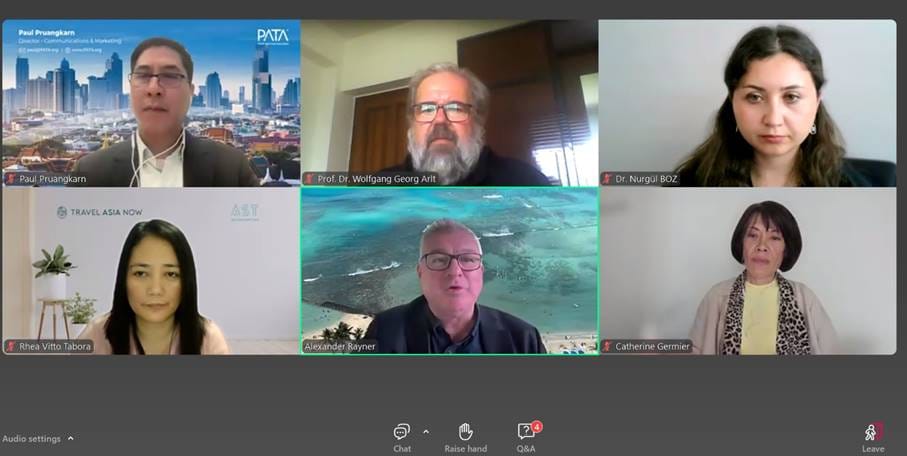
The founder of MTC, Prof. Dr. Wolfgang Georg Arlt, provided a short keynote to introduce the concept and the tools of Meaningful Tourism.
The core of the webinar consisted of three presentations by three of the MTC community members and trainers for Cambodia, Laos, Turkiye, and the Philippines.
Catherine Germier, Founder & CEO of Millennium Destinations, gave an account of her own journey from France to Korea and the Mekong region and how she adopted the Meaningful Tourism as the base for her own work and company.
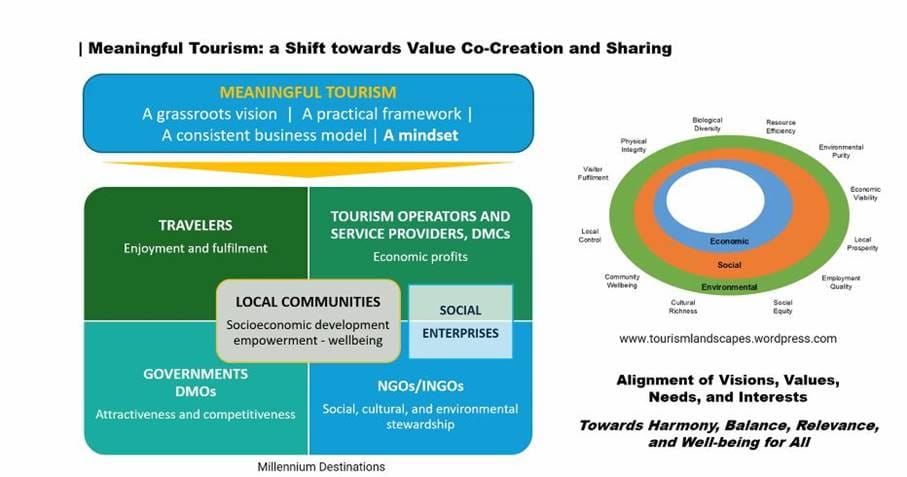
She was followed by Dr. Nurgül Boz, an Assistant Professor at Alanya Alaaddin Keykubat University. Her short but precise presentation discussed how the Meaningful Tourism Transformational Game Workshops can serve as Entry Points to Practical Action, using the example of Turkiye.
The third strong female voice in the webinar spoke about Networks and Information Sources Supporting a Meaningful Tourism Development in the Asia Pacific Region. Rhea Vitto Tabora, Co-Founder of Asia Sustainable Travel (AST) and Founding Editor-in-Chief of Travel Asia Now, clearly pointed out the importance of networks, using practical examples.
She emphasized that we can’t create lasting change working in silos. Networks are what tie us together, allowing us to share experiences, learn from challenges, and celebrate what’s working. Networks act as overlapping circles, bringing together diverse perspectives to create shared solutions for meaningful tourism.
She also highlighted that connections and conversations must be supported by reliable information sources, as clear and practical knowledge is essential for driving meaningful change.

Alexander Rayner, Executive Board Member of PATA followed the three presentations by explaining how and why PATA started to search for a new Vision and decided to use the Meaningful Tourism paradigm, developed by the PATA member MTC and the long-time partner Prof. Dr. Wolfgang Georg Arlt, as the core of the new Vision statement “A Meaningful Pacific-Asia Tourism Economy”.
Unlike many other conference sessions and webinars, the promised Q&A session, led by the MC of the whole webinar, Paul Pruangkarn, the Director - Communications & Marketing of PATA, did actually happen, with 20 minutes spent on answering some of the many questions provided by the audience. Topics ranged from fundamental questions, like the importance of peace within the Meaningful Tourism paradigm, to practical inquiries into the translation into action for hotels and other service providers and the suitability for LDCs.
Thanks to Paul and his experienced PATA team in Bangkok, the webinar went without a glitch, even though the speakers were based across the Asian continent, from Turkiye to the Philippines.
If you missed it or if you want to see the presentations again, a video covering the complete webinar is available here.
Meaningful Tourism Expert Skills and Experiences Matrix and Meaningful Tourism community information ready to download

During the PATA Meaningful Tourism Economy webinar earlier this week, MTC introduced the Meaningful Tourism Expert Skills and Experiences Matrix, providing information about the wide range of skills and experiences which can be used for the Implementation Support of Meaningful Tourism strategies in many different forms.
Furthermore, MTC also uploaded information about all members of the Meaningful Tourism experts and trainer community.
Both information sets can be found here.
In one week, the next group of Meaningful Tourism Transformational Game Workshop will be certified, bringing the total number of experts ready to serve destinations, companies, and organisations around the world close to 50. Their skills and experiences will be added to the matrix and their introduction to the community member introduction.
Nevertheless, MTC is still looking for new trainers who
a. live in a country not covered in dark green
b. have experience in conducting training and/or lecturing
c. share a passion for sustainable tourism
MTC provides online certification workshops, all training materials regularly updated and in different languages, weekly online meetings for all trainers, support with PR and marketing, training organisation, invoicing, etc.
Of course, training workshops are already now covered by trainers for any country if a training is requested by a destination, organisation or company, provided in 20 different languages. For individuals interested in participating, Meaningful Tourism Transformational Game Workshops are offered in August in Bangkok and in November in London. Details are provided in the Event section below.
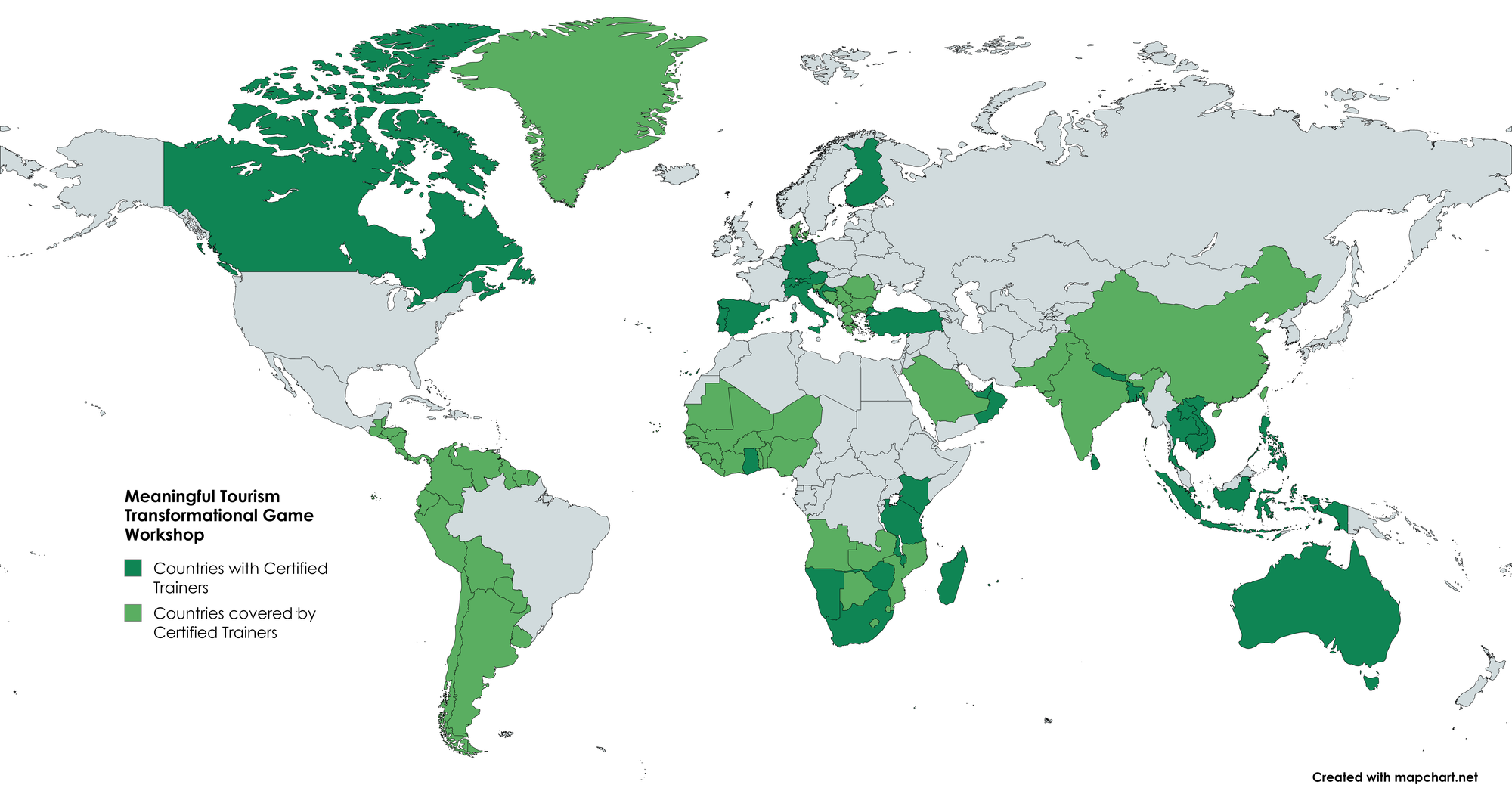
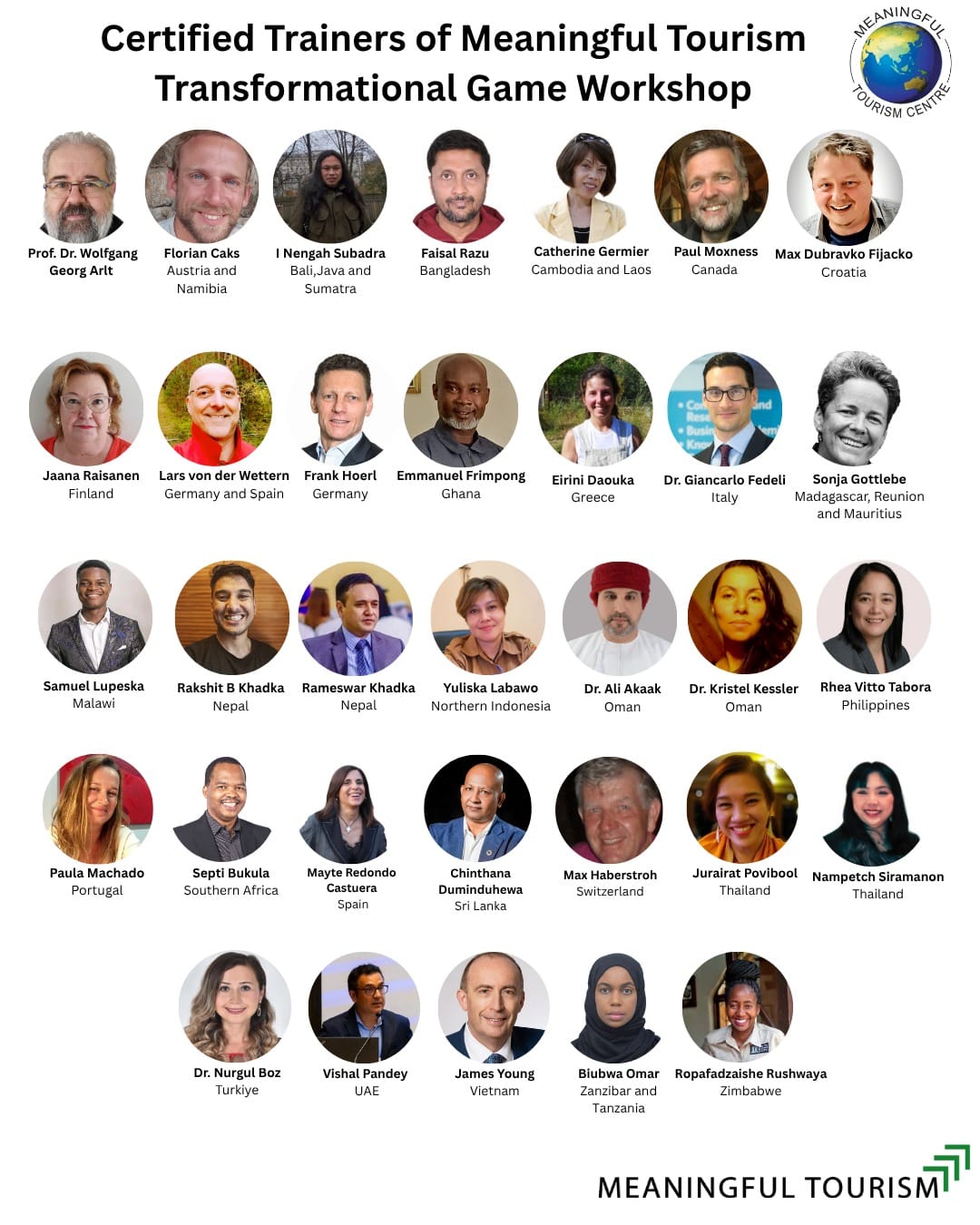

Marine heat threatening beach tourism business models around the Mediterranean
Weather extremes are an obvious result of Climate Change experienced by people in many different countries, killing vulnerable persons directly and increasing health problems in the long run for many others. While South America experienced record-breaking cold winter days in June 2025, Europe saw the highest-ever recorded temperatures for June in many locations. However, not only is the air heating up, also the oceans are getting warmer much faster than earlier predictions suggested.
The Mediterranean Sea, for example, is enduring record-breaking marine heat. Sea surface temperatures have soared 3 – 4°C above average, reaching in June 2025 the highest June levels ever recorded. The persistent marine heatwave is devastating marine ecosystems. Coral die-offs, seagrass loss, and mass fish mortalities are just the beginning. The ripple effects threaten fisheries, food security, and even intensify storms and floods, and tourism.
Since 1980, the Mediterranean has gone from one marine heatwave per year to four, and the extent has increased to a level where they now cover almost the entire sea.
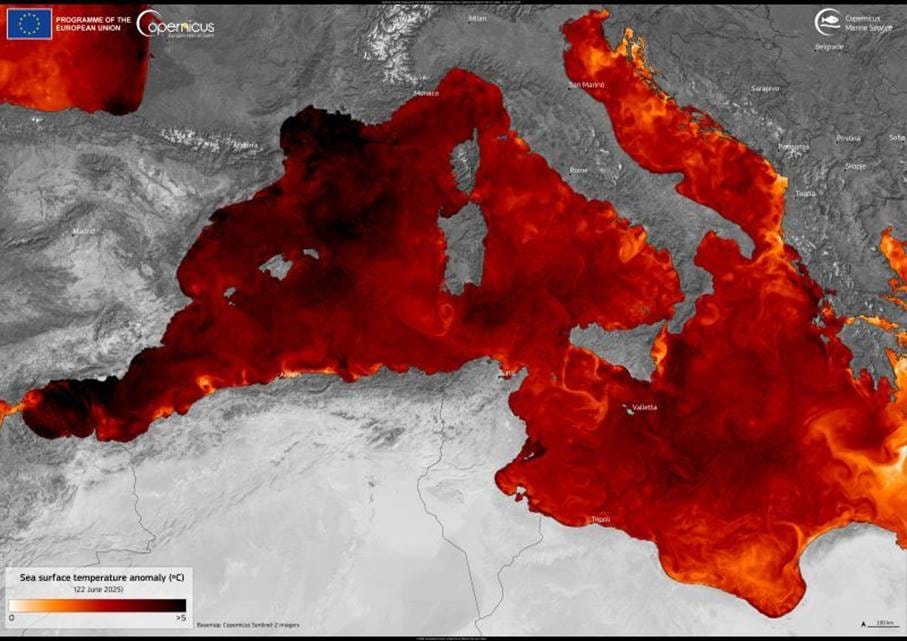
Words instead of actions
In a recently published paper titled Beyond ambition: a review of tourism climate change declaration outcomes and prospects from Baku, tourism researchers Daniel Scott and Stefan Gössling arrive at a rather devastating result.
Analysing the four main international climate declarations signed by governments, tourism bodies, and businesses since 2003, they find that despite decades of climate pledges, hardly any of them have led to change or a reduction in greenhouse gas emissions. Greenhouse gas emissions from tourism, responsible according to the most recent estimates for 9% of the total, are still rising, and the sector is far away from reaching the goal to cut emissions by half by 2030, as many actors have pledged. In a nutshell, the authors conclude “The tourism sector’s response to climate change over the last two decades, has been insufficient.”
The fifth set of pledges, agreed in Baku, Azerbaijan during the 29th United Nations climate conference (COP-29), which for the first time included tourism in a place of prominence, does not get a better mark from the authors. “The Baku Declaration, endorsed by 69 countries and 9 non-state actors, does not provide a robust programme of action to accelerate progress on past climate action pledges that have gone unfulfilled.”
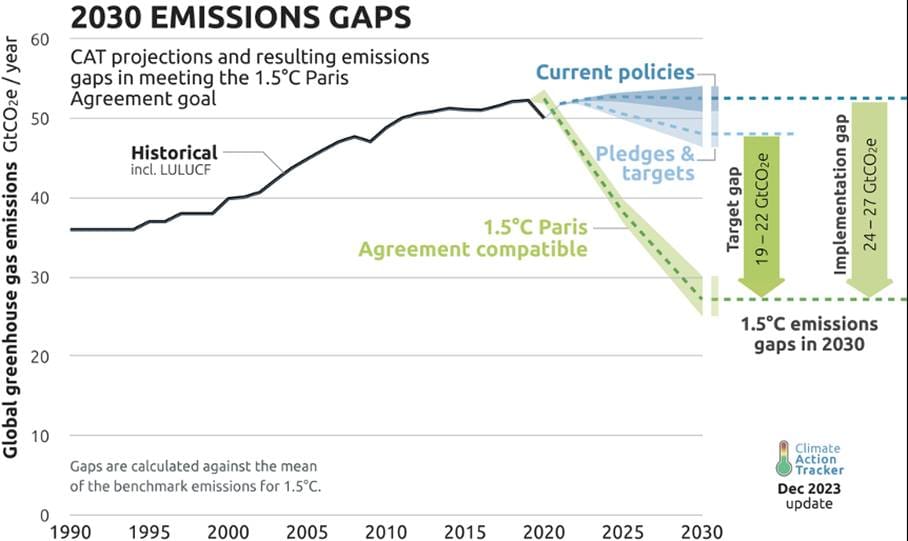

Meaningful Tourism Transformational Game Workshop at PATA Travel Mart, Bangkok
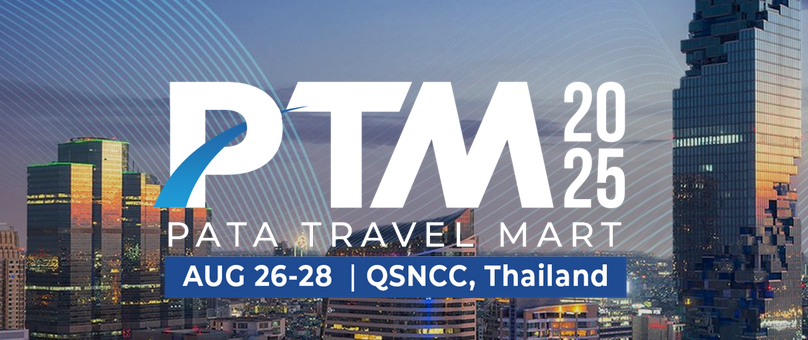
PATA Travel Mart (PTM) is one of Asia Pacific’s longest-standing international travel trade exhibitions featuring networking and contracting opportunities to help travel and tourism organisations access decision-makers, meet new clients, expand their networks, establish new relationships, and consolidate existing business partnerships.
PTM will take place at Queen Sirikit National Convention Center (QSNCC) in Bangkok, Thailand, from August 26 to 28, 2025. On August 26, one of the conference topics will be Meaningful Tourism and the way to a Meaningful Pacific-Asia Tourism Economy, as outlined in the PATA Vision statement. For details on participation, please visit PATA Travel Mart 2025.
The Meaningful Tourism Centre will host a special Meaningful Tourism Transformational Game Workshop on August 25, 2025, the day before the PTM 2025 begins. The workshop will run from 9:00 to 16:00 h and will be conducted by Prof. Dr. Wolfgang Georg Arlt FRGS FRAS, founder of the Meaningful Tourism Centre, together with the Meaningful Tourism trainer for Thailand.
There are only 30 seats available, so if you already know that you will attend PTM 2025, please ensure you arrange your schedule to arrive on time for the training workshop on Monday, August 25th. Book your seat now to enjoy the Super Early Bird fee. Venue: QSNCC Bangkok, details to be advised. Transport from/to the hotel or QSNCC can be arranged on request at a special rate.
Super Early Bird participation fee for bookings paid before July 15, 2025: USD 125 per person
Early Bird participation fee for bookings paid before August 15, 2025: USD 175 per person
Full participation fee for bookings after August 15, 2025: USD 200 per person
VAT included if applicable.
PATA members (including PATA chapter members) enjoy a 15% discount.
Two or more seats booked at the same time enjoy an additional 10% discount.
Please note that payments are non-refundable. However, a change of participant is possible without additional fee until one day before the training workshop.
The participation fee includes training workshop participation, a certificate of participation, one year of free access to all content, including the Meaningful Tourism Weekly Library reserved for paid subscription holders, coffee/tea, cookies, and a vegetarian and non-vegetarian lunch buffet.
For bookings, please contact us at office@meaningfultourismcentre.org.
Bookings will be closed once 30 reservations have been reached. Book today and enjoy the Super Early Bird fee.
Meaningful Tourism Transformational Game Workshop at World Travel Market, London
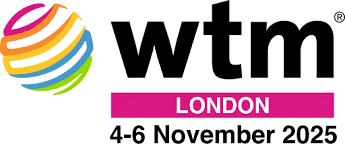
World Travel Market (WTM) in London is one of the must-attend annual events for key players in the tourism industry. The Meaningful Tourism Centre will offer a special Meaningful Tourism Transformational Game Workshop on the day before the start of WTM 2025, on November 3, 2025, from 9:00 to 16:00 hours. The workshop will be conducted by Prof. Dr. Wolfgang Georg Arlt FRGS FRAS, the founder of the Meaningful Tourism Centre.
There are only 30 seats available, so if you already know that you will attend WTM 2025, make sure you arrange your schedule to arrive on time for the training workshop on Monday, November 3, 2025.
Book your seat now and enjoy the Super Early Bird fee.
Venue: Central London, details to be advised. Transport from/to the hotel or Excel London can be arranged on request at a special rate.
Super Early Bird participation fee for bookings paid before July 15, 2025: 125 Euros per person
Early Bird participation fee for bookings paid before September 30, 2025: 175 Euros per person
Full participation fee for bookings starting October 1, 2025: 200 Euros per person
VAT included if applicable.
Two or more seats booked at the same time enjoy an additional 10% discount.
Please note that payments are non-refundable. However, a change of participant is possible without additional fee until one day before the training workshop.
The participation fee includes training workshop participation, a certificate of participation, one year of free access to all content including the Meaningful Tourism Weekly Library reserved for paid subscription holders, coffee/tea, cookies, and a vegetarian and non-vegetarian lunch buffet.
On the evening of November 3, 2025 there will also be a (self-paid) dinner followed by drinks with an opportunity to network with participants and to meet several of the Meaningful Tourism trainers from different countries.
For bookings, please contact office@meaningfultourismcentre.org.
Bookings will be closed once 30 reservations have been reached. Book today and enjoy the Super Early Bird fee.
About Meaningful Tourism Weekly
Meaningful Tourism Weekly, published every Thursday by Meaningful Tourism Centre (MTC) - London and Kathmandu, recently partnered with Travel Asia Now, led by Rhea Vitto Tabora. This collaboration enhances the newsletter’s professional production and distribution, bringing added value to our readers.
Each issue features the Meaningful Tourism Weekly Editorial, updates on MTC activities, a Best Practice Example, a portrait of an MTC-certified trainer, news about upcoming events, and occasionally additional op-ed pieces from guest authors. Carefully selected news items, including videos and podcasts, are also included, along with links to their original sources in the Meaningful Tourism News section.
Subscription to Meaningful Tourism Weekly is free, with the addition of a paid content section that includes a library of surveys, exclusive articles, conference presentations, and statistical data, offering subscribers invaluable resources.
Sponsorship opportunities are available for those interested in supporting this initiative.
For more information about MTC's trainings, market research, product adaptation, consulting services, conferences, strategy development, and marketing, visit our website or email us at info@meaningfultourismcentre.org.

